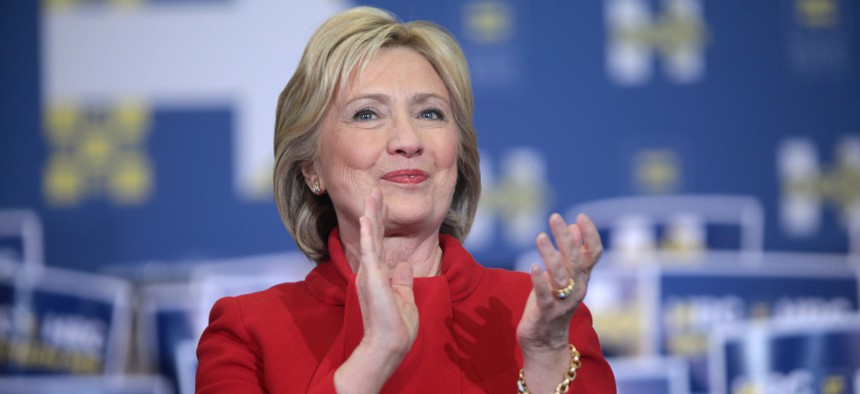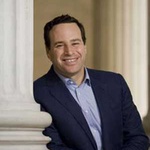
Flickr user Gage Skidmore
Can Hillary Clinton Make Good on This Opportunity?
Given her general election opponent, she has a historic opportunity to unite a grand, cross-party coalition.
The Republicans have made their choice. Now the Democrats’ likely nominee faces a dilemma of her own: Run as a centrist and try to pile up a huge majority—at risk of enraging Sanders voters? Or continue the left turn she’s executed through these primaries, preserve Democratic party unity—at the risk of pushing Trump-averse Republicans back to The Donald as the lesser evil?
The imminent Trump nomination threatens to rip the Republican party into three parts. Trump repels both the most conservative Republicans and the most moderate: both socially conservative regular church attenders andpro-Kasich affluent suburbanites, especially women. The most conservative Republicans won’t ever vote for Hillary Clinton of course. But they might be induced to stay home—if Clinton does not scare them into rallying to Trump. The most moderate Republicans might well cast a cross party line vote—if Clinton can convince them that she’s the more responsible steward and manager.
Those have to be exciting possibilities for the Clinton campaign. For a generation, national politics has been polarized into two unified blocs with minimal cross-over. The Trump nomination suddenly makes imaginable an election like 1964 or 1972, in which a divisive nomination by one party propels millions of voters across the aisle to the other. But the way to win a 1964 or 1972-like victory is to move to the center, to position the winning candidate as the safe choice. Lyndon Johnson and Richard Nixon ran as candidates of peace and order, against destabilizing radicals.
Lyndon Johnson assured the nation in his 1964 convention speech:
Tonight we offer ourselves—on our record and by our platform—as a party for all Americans, an all-American party for all Americans. This prosperous people, this land of reasonable men, has no place for petty partisanship or peevish prejudice. The needs of all can never be met by parties of the few. The needs of all cannot be met by a business party or a labor party, not by a war party or a peace party, not by a southern party or a northern party.
Our deeds will meet our needs only if we are served by a party which serves all our people.
Richard Nixon struck a similar note in 1972.
Six weeks ago our opponents at their convention rejected many of the great principles of the Democratic Party. To those millions who have been driven out of their home in the Democratic Party, we say come home. We say come home not to another party, but we say come home to the great principles we Americans believe in together.
That same opportunity will be present in 2016. But so too will be a danger that neither Johnson nor Nixon had to face. Both those men were incumbent presidents, leading united parties. Hillary Clinton, amazingly, will actually take longer to clinch her nomination than Trump needed to secure his. Her party may be less divided than the Republican party: 80 percent of Democrats say they can support either Clinton or Sanders.
How much room is there in her party to seek a middle path now? Does she evenwant to walk that middle path? Don’t forget that even as she dissented from Obama’s foreign policy on the right, as First Lady she was often said to have criticized her husband’s domestic policy from the left.
Maybe the way to think of this choice is as yet another test facing Clinton on her way to the presidency. How big a figure can she be? Johnson and Nixon, after all, never delivered on that promise of national unity. Within two years of his triumphant re-election, each man inhabited a wrecked presidency: Nixon forced out of office by Watergate; Johnson felled by Vietnam, race riots, and surging urban crime. Can Clinton raise herself to be the kind of president that neither Johnson nor Nixon succeeded in becoming? Can she quell her own suspicions, overcome her own grievances (well-grounded, it must be said, as many of them are)? Can she seize the opportunity thrust upon her by the mistakes and delusions of her opponents. Does she think it worthwhile to try? Can she discipline herself to succeed? If so, the remaking of American politics so often talked of by her eloquent predecessor, Barack Obama, may prove one of the most unexpected accomplishments of this least idealistic of all presidential aspirants.







